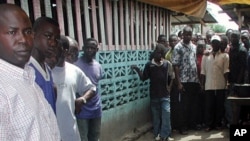Ivory Coast President Laurent Gbagbo recently dissolved a power-sharing government over a dispute about electoral rolls.
The question of who should vote still divides the West African nation into a government-run south and a rebel-held north, eight years after fighting erupted.
African experts agree power-sharing governments have been extremely challenging. But David Shinn a former U.S ambassador to Burkina Faso and Ethiopia says they are still the right approach to end bloodshed.
"The power-sharing arrangements are very difficult to implement in the African context or any context for that matter and there just are not too many cases where they have actually worked, but even having said that, I would still urge that they be tried," he said.
Other experts, though, like Mark Davidheiser who specializes in peace in African studies, view them more as a band-aid which do not address the causes of a conflict. He says they can also worsen corruption.
"The problem is often the rebellious leaders or the insurgency leaders who are then brought into the government, they can be sort of bought off and co-opted into the ruling elite, so that they no longer aspire to serve the will of their people and to help their constituencies, the people they are representing, so that again the seeds of the conflict or the forces animating the conflict, issues behind it, remain intact," he said.
Boston University African Studies Center Director Timothy Longman said opposition members are also often blamed in a power-sharing setting when things go wrong.
"What is actually a stronger answer is to guarantee that the opposition has rights, so that if you want to criticize the government, you are free to do so without being harassed, if you want to publish a newspaper that is critical of the government, you should be able to do that without being harassed, if you want to organize a party, you should be able to do that without being harassed," said Longman.
"And what is very important as well is to make sure that elections are actually free and fair, the reason that we end up with these coalitions is usually because someone has stolen an election," he added.
Longman points to another solution which was tried in post-conflict, ethnically divided, Burundi.
"They set up a system that guarantees both Tutsis and Hutus a certain percentage of the senate, and of the military and of the Cabinet, and then they guarantee some extra seats for the Twa, the smallest ethnic group in the country as well," he said.
Longman says he has been surprised at the results, even if there continue to be sometimes dangerous divisions within Burundi's army.
"The level of ethnic tension in Burundi has really diminished markedly. Now, this is different than a coalition government because it is a government that has free and fair elections but within certain limitations, within certain parameters, that say that we are going to take identity into account when we figure the final results," said Longman.
"That seems to me to be a better option because what has happened in Burundi is now you have got major competition between different Hutu groups who are vying for those positions that are reserved for Hutus, and you have competition between some of the Tutsi groups who are vying for the positions within Tutsis so you get a much more competitive system and I think that is much healthier for the political process," Longman said.
Countries with power-sharing arrangements hoping to help normalize their volatile situations with scheduled elections this year include Sudan, Guinea, Madagascar and Ivory Coast, although delays are possible.
Starting in May, Burundi is scheduled to begin a series of local, legislative and presidential polls.




